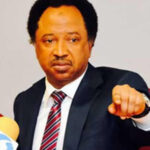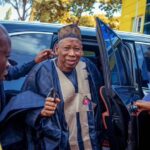There have been a number of commentaries related to happenings in Osun early this year 2020, concerning education and these have focused on the alleged reversal by Governor Gboyega Oyetola, of some policies initiated by the previous government led by Ogbeni Rauf Aregbesola.
These have ignored the fact that the reviewed policy issues are quite a few compared to those adopted and being continuously implemented by the governor.
- ENDSARS: Protesters storm Osun police station, House of Assembly, Govt House
- FG sites hydropower station in Osun
By statistics provided by the West African Examination Council (WAEC), which can be independently verified by anyone, the best performance in West African Senior School Certificate Examination (WASSCE) in Osun during the tenure of the government, which Aregbesola took over from, was 15.68 percent for credit passes and above in English, Mathematics and five other subjects (and this was in the year 2010).
The implication of this was that out of 43,216 pupils presented by that government, only 6,777 pupils had credit passes and above in five subjects, including English and Mathematics.
So in the best year of that government, 36,439 pupils in Osun out of 43,216 could NOT matriculate!
However, the interventions on education by the government led by Aregbesola produced a result in 2018, which was 40.85 percent credit pass in five subjects and above, including English and Mathematics – certainly not good enough yet, but not in the same league as 15.68 percent in 2010 that he met.
Beyond the name change, the reclassification of schools into elementary, middle and high schools does not in any way differ from the National Education Policy.
Our National Education policy specifies One Year Early Child Education, 9 years of Universal Basic Education (UBE) and 3 years of High School Education.
There is no valid certificate in our system in Nigeria any longer for 6 –year education since the UBE law was passed.
By law, no child is permitted to be denied the minimum nine years of Basic Education schooling after which a Basic Education Certificate is issued.
Also by legislation and policy, every child must proceed to year 7 (JSS1) compulsorily and no child is to be discriminated against, prevented or allowed to drop out from proceeding to year 7 (JSS1) through qualifying examinations.
For the administrative convenience of transitioning our previous system of 6-year primary school and 5-year secondary school, the policy provides for 6-year primary school, 3-years of Junior Secondary School and 3 years of Senior Secondary School or Technical College.
Whether you have your school as a single 9- year basic education school, or break it down into 6-year primary school and 3- year Junior Secondary School, or the 4-year Elementary School and 5-year Middle School, as the government led by Aregbesola did, the only valid certificate of schooling is the one issued after the 9-th year Basic Education Certificate Examination (BECE).
By the UBE law, junior secondary schools are to have separate physical structures, assets and management from the senior secondary schools.
This is because junior secondary schools are part of the Universal Basic Education and their costs are covered by the federal government through the Universal Basic Education Commission (UBEC), while the senior secondary schools are exclusively the responsibility of state governments.
Osun was not running the Basic Education System as required by the policy and the UBE law before the government led by Aregbesola. Osun ran the junior secondary schools (JSS) and senior secondary schools (SSS) under the same assets, structures and management inappropriately, because of the reluctance – or may be ignorance – to embrace change from the old order.
So why did the government led by Aregbesola not just break into 6-3-3, rather than change what was supposedly working completely?
The truth was that it was not working, but no one was measuring the output.
If it was working it would not have delivered 15.68 percent in WASSCE in the year 2010 as the best result during the previous government.
The primary schools were sending into the secondary schools, pupils with poor literacy and numeracy skills and poor understanding of basic scientific concepts.
In developed economies, you require a very good first degree from a good university and still require to pass in the qualifying examinations before you can qualify to train as a Teacher.
This is to ensure that the brightest and best teach in their schools and even more particularly, in the primary (or elementary) schools.
Teachers working in Primary Schools are expected to teach most of the subjects to pupils in their classes and so need all-round competence in various subjects.
The Aregbesola-led government was focused on the quality of education given to the child of the ordinary citizen and his/her learning outcomes while many of his critics – and they can be quite loud – have been focused on uniforms, restructuring and names.
Most critics neither have their children nor grandchildren in any of these schools and for many, their only relationship with the schools is that they once attended the schools and for that reason, their words must prevail.
As a credit to the ordinary citizens that Aregbesola sought to serve, the provision and unification of school uniforms, restructuring into elementary, middle and high schools, and the renaming of schools were all concluded by 2013 and even though the noise and conspiracy from these self-appointed critical elites were strident against him, the people showed their appreciation by returning him for a second term in 2014, with more than two-thirds of the votes cast in the state for his re-election.
Omotunde-Young writes from Abuja.
 Join Daily Trust WhatsApp Community For Quick Access To News and Happenings Around You.
Join Daily Trust WhatsApp Community For Quick Access To News and Happenings Around You.


